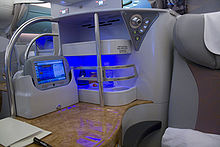Business travel
This article includes a list of general references, but it remains largely unverified because it lacks sufficient corresponding inline citations. (April 2018) |

Business travel is travel undertaken for work or business purposes, as opposed to other types of travel, such as for leisure purposes or regularly commuting between one's home and workplace. According to a survey 88% small business owners enjoy business travel.[1]
Jobs involving business travel[]
In the twenty-first century, many jobs involve periodic or frequent business travel. Common careers involving business travel include:[2]
- Salespeople
- Sales engineers
- Executives
- Field engineers
- Project managers
- Trainers
- Consultants
Additionally, it is common to see doctors, nurses, and other medical professionals flying for work. Often lawyers, politicians, athletes, clergy, military, academics, and journalists conduct business travel on a regular basis.
Negatives to business travel[]
Employees who travel for work on a regular basis often experience loneliness, depression, and reduced mental health. In 2019, 1 in 5 business travelers reported business travel negatively affected their mental health.[3] Additionally, they may miss important family events creating additional relationship stress.[citation needed]
Positives to business travel[]
Business travel has many positive benefits for employees the largest being the opportunity to see parts of the world on the company's expense.[citation needed] Today, many business travellers incorporate bleisure travel into their work travel.[4] Studies on chess imply performance increases during travel.[5]
See also[]
- Business tourism
- Environmental impact of aviation
- Travel Management Companies
References[]
- ^ Haileyesus, Samson (12 January 2020). "88% of Small Business Owners Enjoy Business Travel". Small Business Trends. Samson Haileyesus.
- ^ Group, The C. Boarding (9 May 2019). "23 Jobs with Travel - the ultimate list of travel jobs (that will take you around the world)". C Boarding Group - Business Travel. Retrieved 20 January 2020.
- ^ "Study: More than 20 Percent of Business Travelers Cite Negative Mental Health Effects: Business Travel News". www.businesstravelnews.com. Retrieved 20 January 2020.
- ^ Landrum, Sarah. "How Millennials Are Redefining Business Travel". Forbes. Retrieved 20 January 2020.
- ^ Zak, Uri (28 August 2021). "The performance advantage of traveling". Journal of Economic Psychology. doi:10.1016/j.joep.2021.102431.
Bibliography[]
- Davidson, Rob; Cope, Beulah (2003), Business Travel: Conferences, Incentive Travel, Exhibitions, Corporate Hospitality, and Corporate Travel, Pearson Education, ISBN 9780582404441
- Beaverstock, Jonathan; Derudder, Ben; Faulconbridge; Witlox (2012), International Business Travel in the Global Economy, Ashgate Publishing, ISBN 9781409488439
- Swarbrooke, John; Horner, Susan (2012), Business Travel and Tourism, Routledge, ISBN 9781136423062
External links[]
![]() Business travel travel guide from Wikivoyage
Business travel travel guide from Wikivoyage
- Business travel
- Types of travel